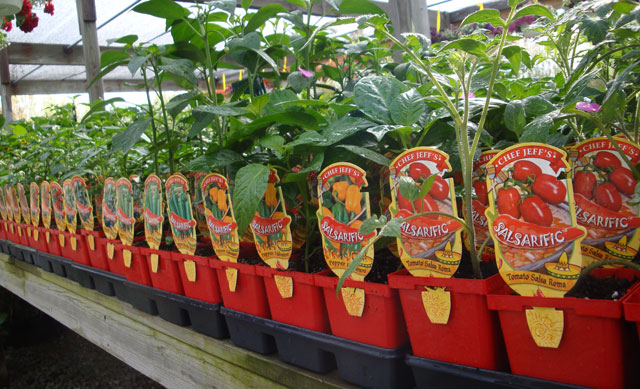
If you follow any kind of news regarding the food or gardening industry, you have most likely heard or seen the acronym GMO. But just what is it and what does it stand for? And how concerned should we be?
What are they?
GMO or “genetically modified organisms” refers to plants or animals which are produced by way of gene splicing or biotechnology. If these words are a little too scientific for you, all you need to know is that it refers to food which is produced by creating combinations not naturally occurring in nature. This is done so by an experimental process involving each plant’s or animal’s DNA.
Why were they developed in the first place?
The use of GMOs has enabled growers/suppliers to increase their profits as a result of producing more salable products. Many of the genetically modified crops have bacterial genes inserted which allow them to survive in spite of fatal doses of weed killers. Therefore, the residue left by herbicides is much higher on these crops. Other genetically-modified crops have an actual “built-in” pesticide which secretes insect-killing toxin into every cell of the plant.
Why is there such an opposition to GMOs?
The production and sale of GMOs has been banned in nearly 50 countries worldwide, including Australia, Japan, and most of Europe. Although not completely proven, foods containing GMOs have been said to increase the occurrence of allergies, toxins, new diseases, and various nutritional problems, according to the Institute for Responsible Technology. In various other animal tests, some serious health risks were noted, such as infertility, issues with immunity, accelerated aging, as well as poor regulation of insulin. Some also believe that these altered genes may remain in a person’s body for quite some time, giving them the capability to create super diseases which would be resistant to antibiotics.
What foods are produced using GMOs?
The most common crops which are known to be produced by GMO’s are as follows (percentages are from 2010 and 2011 according to the Non GMO Project website):
- Canola (approx. 90% of all U.S. crops)
- Corn (approx. 88% of all U.S. crops)
- Cotton (approx. 90% of all U.S. crops)
- Soy (approx. 94% of the all U.S. crops)
- Sugar Beets (approx. 95% of all U.S. crops)
- Various animal products (such as milk, meat, eggs, and honey) are also said to be “High Risk” due to the contamination in the foods these animals digest.
How do I know what food is safe and how can I start to make a change?
Unfortunately, choosing foods which are “safe” and non-GMO takes a certain amount of trust in the label and the company producing it. However, there are a few crops which are considered extremely “low risk” based on their history (this is again according to the Non-GMO Project):
- Tomatoes: Due to issues with flavor and ability to withstand the shipping process, there are currently no known genetically-modified tomatoes in commercial production.
- Potatoes: The NewLeaf line of potatoes produced by Mansanto in 1996 was largely rejected by fast food chains and producers of potato chips, making it a total flop by 2001. Therefore, there are currently no known genetically-modified potatoes in production.
- Wheat: Although commonly assumed to be GMO, there are currently no genetically-modified wheat crops which the Non-GMO Project is aware of.
Purchasing organic foods is not necessarily a sure-fire way to avoid GMOs, but it is a good place to start. The Non-GMO Project also verifies certain foods and you can look for this verification label at your local grocery store. Their website also contains a search in which you can look up specific foods and brands.
The other option (and MY preferred one) is to obtain some of your foods from your own back yard! While it may not be possible to have your own cow or chickens, you can most definitely try your hand at growing some of your own fruits and vegetables. New to Holland Bulb Farms this year is the Chef Jeff line of live plants, all packed in 4″ containers and delivered right to your door-step! All of the plants Chef Jeff provides are certified as non-GMO and also guaranteed to be free of chemical growth regulators and harsh chemicals. Holland Bulb Farms also continues to sell their line of organic seed which would be a great, inexpensive way to know just what has or has not been applied to your fruits and veggies.

Is there anything else I can do to help stop this in the industry?
One of the best things you can do as a consumer is to avoid purchasing genetically modified foods whenever possible. If more people refuse to buy, less and less will be produced. You can also visit the Non-GMO Project’s “Get Involved” page for more ideas.
So just how worried should you be? Honestly, this is an extremely personal question which each individual should research and answer for him- or herself. The topic of GMOs and genetically engineered food is an extremely large and complicated one with many different views. I’ll be the first to admit that I don’t have the money, time, or energy to completely change the way I shop and in turn, the way my family eats. I also know that if I tried to take away my husband’s frozen pancakes and sausage on a stick he devours every morning, I would have one unhappy camper on my hands. But I’ll tell you what I am going to do: I’m going to start small. One step at a time. Perhaps I’ll work harder this year at growing some of my own food. I think I’ll start by overhauling our breakfast… That can’t be too bad, right?
If any of you have any helpful tips or tricks you’ve decided to try, please feel free to share them in the comments below. I’d love to hear from you!


